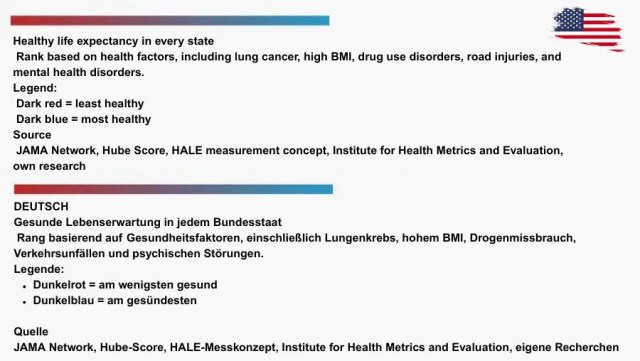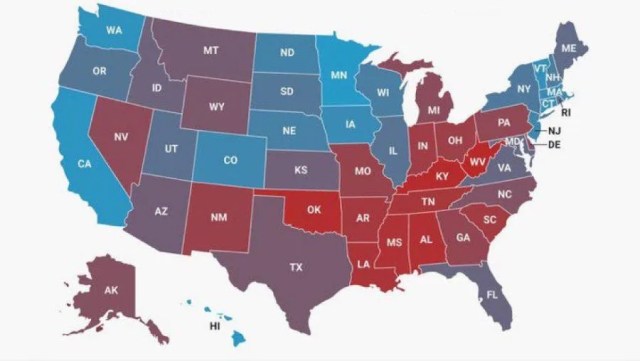Our months-long research and data collection ultimately revealed a crystal-clear picture: the health gap between Democratic and Republican governed states is not a statistical anomaly - it is the result of deliberate political decisions that can be measured in human lives. This investigation began as a sober data analysis. What we found was shocking: in Republican governed states, people not only die earlier, but also live their remaining years in poorer health. The difference - over six healthy years - is not a law of nature, but the consequence of a policy that puts ideology above science, short-term economic interests above long-term public health, and a perverted concept of freedom above the fundamental right to life. The numbers speak for themselves: West Virginia with its 63.8 healthy years stands against Massachusetts with 69 years, Hawaii with over 70.5 years. Mississippi records twice as many preventable deaths as Vermont. In Texas more children die before their first birthday than in any European country. These are not abstract statistics - they are mothers, fathers, children whose lives have been shortened by political decisions. What makes these data particularly explosive is that they show a pattern of systematic neglect. The rejection of Medicaid expansion, the resistance to prevention programs, the deregulation of environmental standards - all these are not isolated decisions but part of a coherent political philosophy that measurably kills. One could put it cynically: by electing Republican candidates Americans statistically choose an earlier death. But that would be too simple. What our research really shows is a fundamental failure of political responsibility. While other industrial nations modernize their health systems, Republican politicians cling to a 19th century ideology - with deadly consequences for the 21st century. These data belong in every polling station, every town hall, on every kitchen table. Not as party propaganda, but as a warning: politics is not an abstract exercise. It decides over life and death, over healthy years and preventable suffering.
Republican health policy is not only outdated - in its rejection of scientific findings and its disregard for public health it is profoundly irresponsible. When politicians put the freedom of the tobacco industry above the lung health of their citizens, when they push through tax breaks for corporations instead of funding prevention programs, when they fuel vaccine skepticism instead of promoting science, that is not conservative policy - it is a capitulation of the most basic duty of the state: to protect its citizens. The question is not whether we can afford better health policy. The question is whether we can afford to keep sacrificing people on the altar of ideology. The answer is in the data - and hopefully at the next election in the voting booth.


Death does not come evenly in America. It favors ZIP codes in West Virginia, Kentucky and Mississippi while avoiding Massachusetts, Hawaii and Minnesota. This macabre geography of mortality follows a pattern so precise that it is frightening: where Republican governors rule and conservative health policy dominates, people not only die earlier - they also live their remaining years sicker. The numbers from JAMA Network are clear: 63.8 healthy years in West Virginia versus over 70 years in Hawaii. Six years of difference - that equals the entire childhood of a person, the span between first day of school and high school graduation. But this gap is not a law of nature. It is the result of political decisions that manifest themselves in flesh and blood.
Hawaii: The Health Island
According to the "Hub Score" 2023 and other current rankings, Hawaii is the healthiest U.S. state. In the ranking of highest life expectancies Massachusetts, 70.4 years, lands at the very top - just behind Hawaii, 70.5 years, but still ahead of Minnesota 70.3 years and California.

The Cartography of Early Death
Looking at the American health map reveals a divided country. The South glows in alarming red: Louisiana, Mississippi, Alabama, Arkansas, Oklahoma, Kentucky, Tennessee, South Carolina and West Virginia - all states with Republican dominance in governor’s office and legislature. This region, often lovingly called the "Bible Belt," could more aptly be called the "Mortality Belt." The causes read like a protocol of political omissions: West Virginia leads the nation in drug overdoses at a rate three times the national average. The opioid crisis, which rages particularly hard here, meets a thinned-out health system. While Massachusetts spends 73% more per capita on public health than the national average, West Virginia is 41% below. These numbers are no abstractions - they mean closed hospitals in rural areas, missing addiction counseling centers, non-existent prevention programs.
Kentucky, firmly in Republican hands, records the highest lung cancer rate in the nation. No coincidence in a state that courted the tobacco industry for decades and still resists strict smoking bans. Mississippi, where 40% of adults are classified as obese, simultaneously has the lowest physician density per capita. In Alabama every tenth baby dies before its first birthday - an infant mortality rate that recalls developing countries rather than the richest nation on earth.
The Massachusetts Miracle and its Political Roots
At the other end of the spectrum Massachusetts, always among the top 3, stands like a beacon of health. The state, dominated by Democrats for decades, under governors like Mitt Romney (ironically a Republican but pragmatic in Massachusetts) and later Deval Patrick built a health system that served as a model for Obama’s Affordable Care Act.

The "Romneycare" of 2006 was revolutionary: health insurance became mandatory, the state subsidized contributions for low-income earners, companies were held accountable. The result: 97% insurance coverage, the highest in the nation. But Massachusetts went further. The state invested massively in prevention: school programs against obesity, free mammograms, statewide vaccination campaigns, strict regulation of trans fats in restaurants. Harvard Medical School and Massachusetts General Hospital are not only centers of medical excellence - they are engines of a health culture that puts science above ideology. When schools in West Virginia cut lunches for budget reasons, Massachusetts introduces mandatory nutrition courses. While Kentucky subsidizes the coal industry, Massachusetts invests in clean air initiatives.
The Mechanics of Political Bodily Harm
Republican health policy follows a consistent philosophy: the market regulates, the state stays out, personal responsibility trumps collective solidarity. This ideology translates into concrete policy: rejection of Medicaid expansion under the Affordable Care Act, resistance to vaccine mandates, loosening of environmental standards, protection of the tobacco and sugar industry.
Ten Republican governed states rejected Medicaid expansion, which would have brought millions of Americans access to health care. The consequences are measurable: in Texas, which refused expansion, 18% of the population remain uninsured. In expansion states like Massachusetts this rate is below 3%. A study by the National Bureau of Economic Research found that Medicaid expansion prevents 19,200 deaths per year. That means an estimated 19,200 people die unnecessarily every year in Republican refusal states.
The Exceptions to the Rule: When the Political Formula Does Not Work
The reality of American health policy is more complex than the red-blue dichotomy suggests. Utah, firmly Republican for decades, shows a healthy life expectancy of about 67 years - well above the national average and better than some Democratic states. Vermont and New Hampshire, both with a long Republican tradition in their history, are in the upper middle field of the nation’s states. But that is about it.

What makes Utah different? The state benefits from a unique cultural factor: 62% of the population are Mormons, whose religious teaching forbids alcohol, tobacco and drugs. This cultural imprint is stronger than any health policy. Utah has the lowest smoking rate in the nation (8.9%), the lowest alcohol consumption rate and a strong community structure that prevents social isolation. This shows that culture can surpass politics. Conversely New Mexico, despite Democratic leadership, struggles with a healthy life expectancy of only 65.9 years. The reasons are multifaceted: historical neglect of the indigenous population, geographic isolation, poverty that runs deeper than any party politics.
The Political DNA of Mortality
The correlation between political leadership and health is so precise that it is frightening. Of the ten states with the lowest healthy life expectancy nine are governed by Republicans. Of the ten healthiest states eight have Democratic governors. These patterns are no coincidence. They reflect fundamental differences in health philosophy. Republican states follow the mantra: the market regulates, personal responsibility trumps collective solidarity, freedom means freedom from government interference. This philosophy translates into concrete policy:
- Medicaid refusal: ten Republican states rejected the expansion. Result: 2.2 million Americans without insurance coverage, 19,200 preventable deaths annually, according to study estimates.
- Deregulation: Texas celebrated the loosening of environmental standards as a victory for freedom. Result: Houston now has worse air quality than Beijing, asthma rates among children have exploded by 23%.
- Prevention hostility: Florida fought against vaccine mandates, Tennessee against sugar taxes, Mississippi against smoking bans. The bill is paid in bodies.

Democratic states, on the other hand, treat health as a public good. California was the first state to introduce smoking bans in restaurants - the lung cancer rate dropped by 28%. Vermont guarantees universal health care for children - child mortality is the lowest in the nation. Minnesota invested massively in mental health - the suicide rate is 40% below the national average. The gap between best and worst states is large: according to CDC data the difference is up to 6.5 years (for example Hawaii vs. Mississippi/West Virginia).
The Pandemic as a Magnifying Glass
COVID-19 acted like an X-ray on America’s health divide. The political response to the pandemic correlated directly with death rates. States that rejected mask mandates and tolerated vaccine skepticism paid in corpses.
The numbers are clear: after vaccines became available, 73% more people per capita died in Republican counties than in Democratic ones. Florida and Texas, which celebrated themselves as bastions of "freedom," recorded 90,000 more deaths together than California and New York - even though they have younger populations.
West Virginia, once a national leader in vaccination rates, collapsed under Republican leadership. The state that eradicated smallpox in the 1960s failed to vaccinate its population against COVID in 2021. Excess mortality reached 423 per 100,000 - in Massachusetts it was 187.
The Paradox of Deadly Freedom
The most tragic element of this story is the paradox of freedom. States that shout "freedom" the loudest produce the least free citizens - tied to dialysis machines, dependent on opioids, trapped in sick bodies.
Texas, which has no health insurance mandate, has the highest rate of uninsured children. The "freedom" not to be insured ends for 20,000 Texan children annually in the emergency room with preventable complications. The "freedom" of industry from environmental regulations led to "Cancer Alley" in Louisiana, where the cancer rate is 50% above the national average.
Minnesota shows the alternative: 70.3 healthy years are not a restriction of freedom - they are its foundation. Citizens are free to work, travel, live because preventive medicine protects them from preventable diseases.
The Future: Two Biological Nations
What we are witnessing is the emergence of two biologically distinct Americas. In one, people live as in Scandinavia - long, healthy, productive. In the other life expectancy resembles that of developing countries. This divide will deepen. While blue states invest in telemedicine and climate resilience, red states continue to loosen regulations. The projections are bleak: by 2030 the life expectancy gap between Hawaii and West Virginia could grow to nine years. The ultimate irony: the party that writes "Pro-Life" on its banners governs over the most preventable deaths. The politicians who preach individual responsibility create systems in which individuals have no chance. And the Americans who dream the loudest of American greatness die earlier than citizens of any other industrial nation.

Robert F. Kennedy Jr., right in the picture, is as Secretary of Health one of the most dangerous personnel decisions of this administration - a longtime anti-vaccine activist who systematically undermines scientific standards. Under his leadership thousands of health officials have been fired, vaccine commissions dissolved and CDC recommendations politically rewritten. The firing of CDC director Susan Monarez was an open attack on independent science and triggered a wave of resignations. With the appointment of the non-medically trained Jim O’Neill (center of picture) as interim director Kennedy continues the politicization of public health - in the middle of a measles and flu season. His policy endangers trust in vaccinations and thus the lives of millions.
In this America it is no longer only the wallet that decides over life chances. The party affiliation of your governor becomes the unofficial death sentence. Your ZIP code determines not just where you live - but how long.
Investigative journalism requires courage, conviction – and your support.
Behind every article – especially our in-depth investigative reports – lies significant journalistic effort and financial investment. We do not wish to fund our work through paywalls, but through your voluntary support. How often and in what amount you contribute is entirely up to you – whether as a one-time or recurring contribution.

Sehr guter und interessanter Artikel!
Dankeschön 🙏🏼
Ich danke dir
Die Parteizugehörigkeit deines Gouverneurs wird zum inoffiziellen Todesurteil.
Dieser Satz hat mich frösteln lassen.
…ja, das ist schon eine harte nummer, das waren die recherchen auch, wenn man so genau dahinter schaut
Ein sehr guter Bericht Rainer.
Pro-Life sind sie nur, wenn es um das ungeborene Kind geht.
Da wird alles getan, damit es geboren wird..
Und ist es auf der Welt, ist das Interesse 0. Da wird die Verantwortung zurück an die Mutter gegeben.
Kinder unversorgt zu lassen ist furchtbar.
Aber bei den Republikanern zählt „nur der Stärkste überlebt“ und „es ist Gottes Wille“.
Aluhut und Gebete, statt Prävention und Gesundheitsversorgung.
Und es wird schlimmer werden.
Denn wie lange werden sich die demokratischen Staaten gegen all die Dekrete wehren können?
Und was ist nach den Midterms?
Ich gehe von wahrscheinlich manipulierten Wahlen und mehr Staatdn für die Republikaner aus.
…ja das war auch eine sehr aufwendige recherche und es ist krass, wenn man mal so richtig hinter den vorhang schaut